Unit 5 Do you want to watch a game show?单词讲解 课件(共30张PPT)
文档属性
| 名称 | Unit 5 Do you want to watch a game show?单词讲解 课件(共30张PPT) | 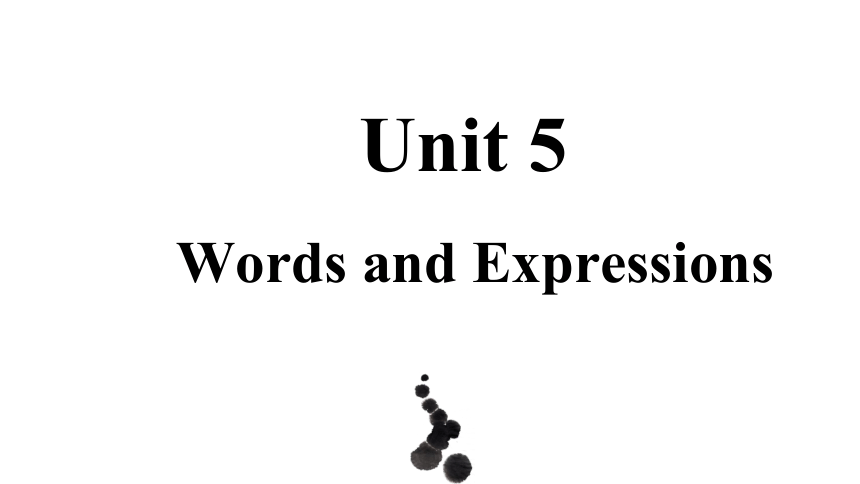 | |
| 格式 | zip | ||
| 文件大小 | 234.1KB | ||
| 资源类型 | 教案 | ||
| 版本资源 | 人教新目标(Go for it)版 | ||
| 科目 | 英语 | ||
| 更新时间 | 2022-01-30 10:29:37 | ||
图片预览



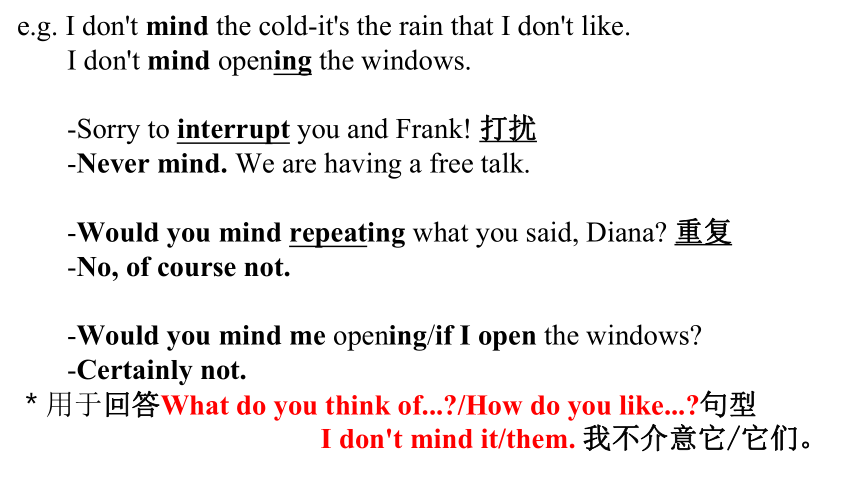
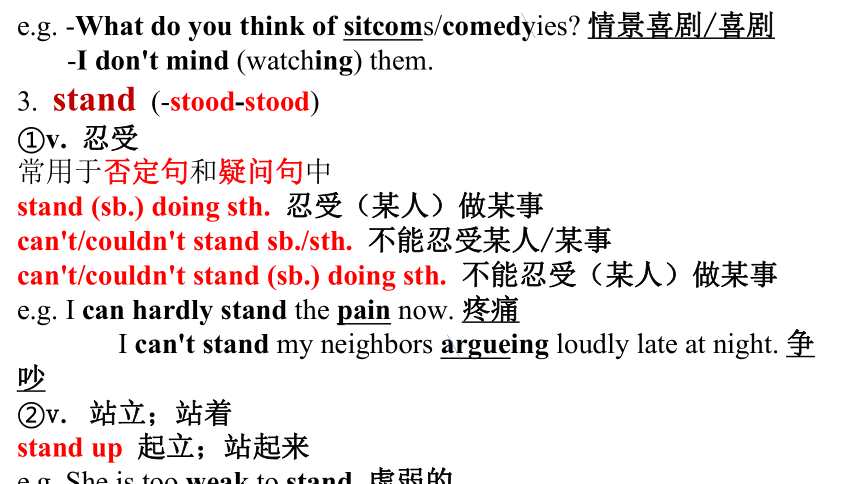
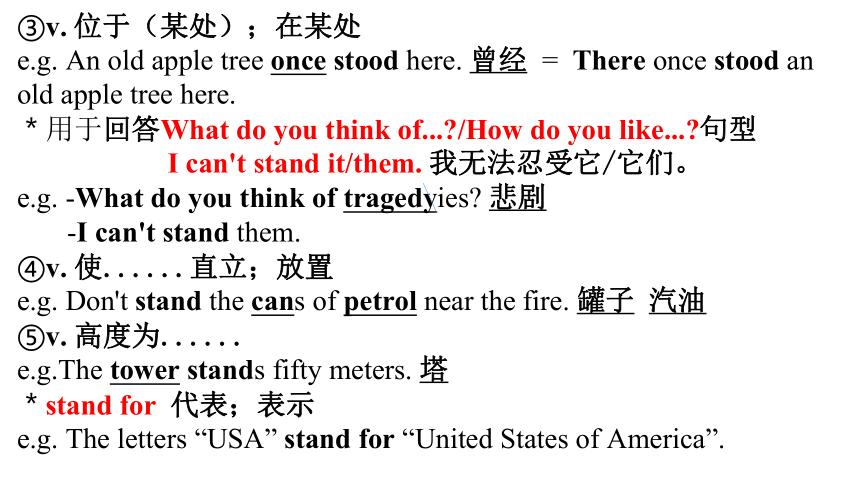
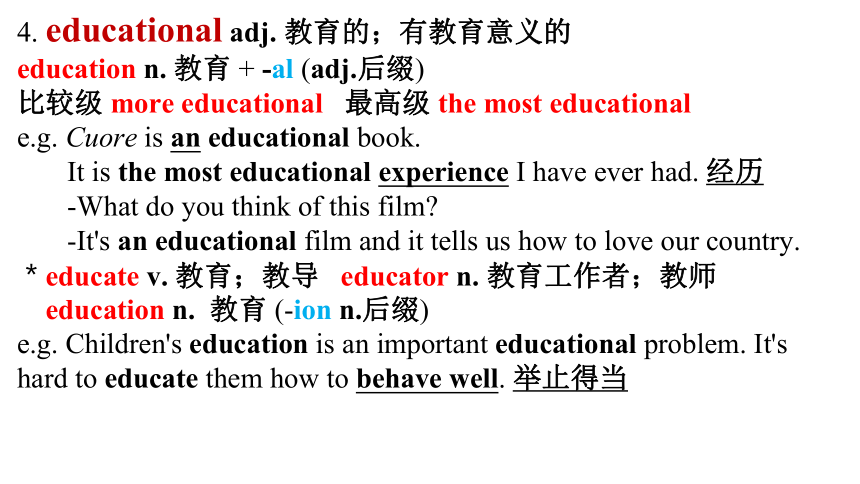
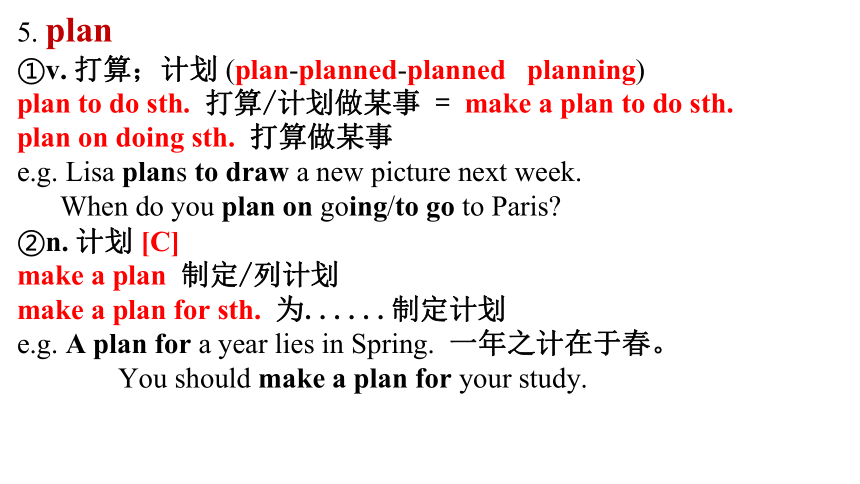
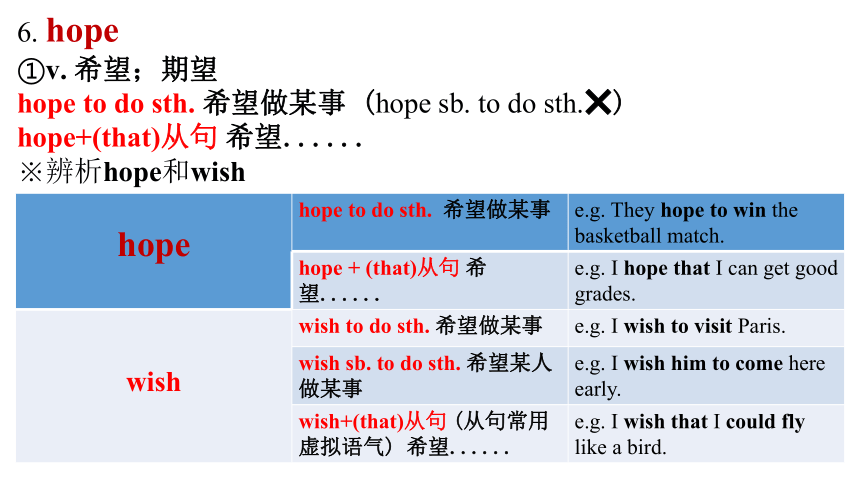
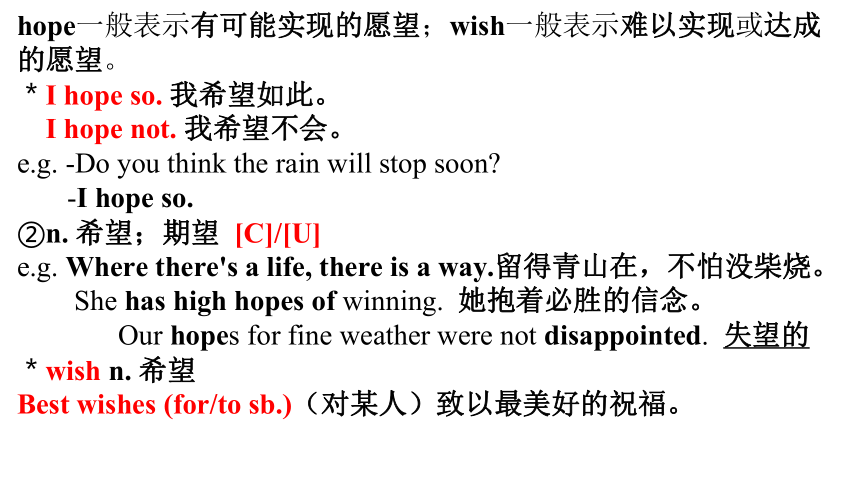
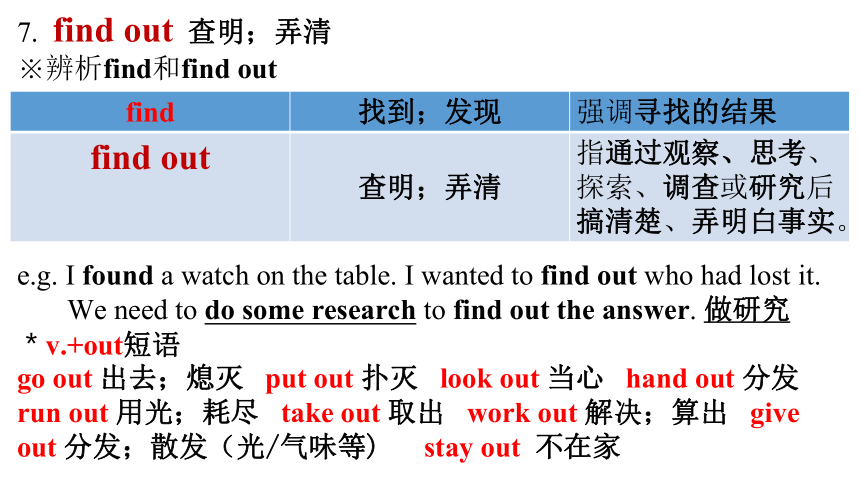
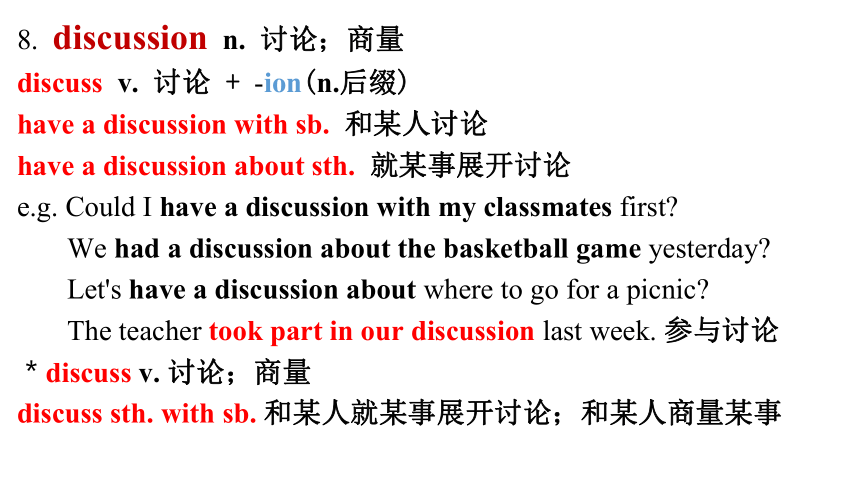
文档简介
(共30张PPT)
Unit 5
Words and Expressions
1. news
①n. 新闻节目;新闻 [U]
a piece of news 一条新闻
e.g. This is a piece of news that people are interested in.
I couldn't get much news of exhibition of clean-energy products from the website. 展览 清洁能源 网站
Have you ever read the news about the big fire in the newspaper
②n. 消息 [U]
e.g. No news is good news. 没有消息就是好消息。
I am looking forward to your great news. 期待 好消息
*newspapaer n. 报纸 [C]
in the newspaper 在报纸上
read newspapers = read a/the newspaper 看报纸
daily newspaper 日报
the morning/evening newspaper 早/晚报
2. mind v. 介意;对(某事)烦恼
常用于否定句、疑问句和条件状语从句中,后接n./pron./v.-ing。
mind (sb. doing) sth. 介意(某人做)某事
never mind = it doesn't matter = no problem 没关系
*Would you mind (sb./one's) doing sth. 你介意(某人)做某事 吗?
= Would you mind if sb. do/does sth. 如果某人做某事,你介意吗?
回答:
表达“不介意”:Not at all./ Certainly not. / Of course not.
表达“介意”:I'm sorry, but.../ Sorry, you had better not./ I am afraid you can't.
e.g. I don't mind the cold-it's the rain that I don't like.
I don't mind opening the windows.
-Sorry to interrupt you and Frank! 打扰
-Never mind. We are having a free talk.
-Would you mind repeating what you said, Diana 重复
-No, of course not.
-Would you mind me opening/if I open the windows
-Certainly not.
*用于回答What do you think of... /How do you like... 句型
I don't mind it/them. 我不介意它/它们。
e.g. -What do you think of sitcoms/comedyies 情景喜剧/喜剧
-I don't mind (watching) them.
3. stand (-stood-stood)
①v. 忍受
常用于否定句和疑问句中
stand (sb.) doing sth. 忍受(某人)做某事
can't/couldn't stand sb./sth. 不能忍受某人/某事
can't/couldn't stand (sb.) doing sth. 不能忍受(某人)做某事
e.g. I can hardly stand the pain now. 疼痛
I can't stand my neighbors argueing loudly late at night. 争吵
②v. 站立;站着
stand up 起立;站起来
e.g. She is too weak to stand. 虚弱的
③v. 位于(某处);在某处
e.g. An old apple tree once stood here. 曾经 = There once stood an old apple tree here.
*用于回答What do you think of... /How do you like... 句型
I can't stand it/them. 我无法忍受它/它们。
e.g. -What do you think of tragedyies 悲剧
-I can't stand them.
④v. 使......直立;放置
e.g. Don't stand the cans of petrol near the fire. 罐子 汽油
⑤v. 高度为......
e.g.The tower stands fifty meters. 塔
*stand for 代表;表示
e.g. The letters “USA” stand for “United States of America”.
4. educational adj. 教育的;有教育意义的
education n. 教育 + -al (adj.后缀)
比较级 more educational 最高级 the most educational
e.g. Cuore is an educational book.
It is the most educational experience I have ever had. 经历
-What do you think of this film
-It's an educational film and it tells us how to love our country.
*educate v. 教育;教导 educator n. 教育工作者;教师
education n. 教育 (-ion n.后缀)
e.g. Children's education is an important educational problem. It's hard to educate them how to behave well. 举止得当
5. plan
①v. 打算;计划 (plan-planned-planned planning)
plan to do sth. 打算/计划做某事 = make a plan to do sth.
plan on doing sth. 打算做某事
e.g. Lisa plans to draw a new picture next week.
When do you plan on going/to go to Paris
②n. 计划 [C]
make a plan 制定/列计划
make a plan for sth. 为......制定计划
e.g. A plan for a year lies in Spring. 一年之计在于春。
You should make a plan for your study.
6. hope
①v. 希望;期望
hope to do sth. 希望做某事 (hope sb. to do sth. )
hope+(that)从句 希望......
※辨析hope和wish
hope hope to do sth. 希望做某事 e.g. They hope to win the basketball match.
hope + (that)从句 希望...... e.g. I hope that I can get good grades.
wish wish to do sth. 希望做某事 e.g. I wish to visit Paris.
wish sb. to do sth. 希望某人做某事 e.g. I wish him to come here early.
wish+(that)从句 (从句常用虚拟语气) 希望...... e.g. I wish that I could fly like a bird.
hope一般表示有可能实现的愿望;wish一般表示难以实现或达成的愿望。
*I hope so. 我希望如此。
I hope not. 我希望不会。
e.g. -Do you think the rain will stop soon
-I hope so.
②n. 希望;期望 [C]/[U]
e.g. Where there's a life, there is a way.留得青山在,不怕没柴烧。
She has high hopes of winning. 她抱着必胜的信念。
Our hopes for fine weather were not disappointed. 失望的
*wish n. 希望
Best wishes (for/to sb.)(对某人)致以最美好的祝福。
7. find out 查明;弄清
※辨析find和find out
e.g. I found a watch on the table. I wanted to find out who had lost it.
We need to do some research to find out the answer. 做研究
*v.+out短语
go out 出去;熄灭 put out 扑灭 look out 当心 hand out 分发 run out 用光;耗尽 take out 取出 work out 解决;算出 give out 分发;散发(光/气味等) stay out 不在家
find 找到;发现 强调寻找的结果
find out 查明;弄清 指通过观察、思考、探索、调查或研究后搞清楚、弄明白事实。
8. discussion n. 讨论;商量
discuss v. 讨论 + -ion(n.后缀)
have a discussion with sb. 和某人讨论
have a discussion about sth. 就某事展开讨论
e.g. Could I have a discussion with my classmates first
We had a discussion about the basketball game yesterday
Let's have a discussion about where to go for a picnic
The teacher took part in our discussion last week. 参与讨论
*discuss v. 讨论;商量
discuss sth. with sb. 和某人就某事展开讨论;和某人商量某事
9. happen
①vi. 发生;出现 常指偶然发生 主语是物
sth. happen(s) to sb./sth. 某人/某物发生某事;某事发生在某人身上/某物上
sth. happen(s)+时间状语/地点状语 某时/某地发生某事
e.g. What happened to Mrs. Smith/my mobile phone 怎么了/发生了什么事?
An accident happened in that street. 事故
※辨析happen和take place
happen 指具体客观事件发生,有偶然性,未能预见。 主语是表示事件的n./pron.。 e.g. The traffic accident happened during the morning rush hour. 交通事故 早高峰
②v. 碰巧
sb. happen(s) to do sth. 某人碰巧做某事
It happen(s) that... 碰巧......
e.g. I happened to know that my grandpa used to collect tea sets. 过去常常收藏茶具
It happened that I was out when he called. 出去
take place 指根据事先安排或计划发生,含有事先预料或准备的意思,没有偶然性。主语是表示动作、活动的n.。 还有“举办”的意思。 e.g. The class meeting will take place on Friday.
The Olympic Games take place every four years.
10. expect v. 预料;期待
expect sth./sb. 期待/等待某物/人
expect to do sth. 期望/指望做某事
expect sb. to do sth. 期望/预料某人做某事
expect+that从句 预料......
e.g. I was expecting him yesterday.
I expect to see him tomorrow.
You can't expect to learn a foreign language in a few months. 外语
Teachers expect all their students to make progress day by day. 进步
I expect that I will be back on Sunday.
The scenery was not so fine as we expected. 景色 如我们所料
*unexpected adj. 出乎意料的;始料未及的
e.g. Life is full of the unexpected. 生活充满了意外。
11. joke
①n. 笑话;玩笑 [C]
tell a joke/jokes 讲笑话
play a joke/jokes on sb. 和某人开玩笑
e.g. My grandpa likes to tell jokes.
We played a joke on John just now.
②v. 开玩笑 = kid
e.g. Are you joking/kidding 你在开玩笑吗?
12. meaningless adj. 毫无意义的;意思不明确的
meaning n. 意思 + -less(adj.后缀)
e.g. She thinks it is meaningless to watch soap operas.
This article is meaningless to me. 对我来说,这篇文章晦涩难懂。
*mean v. 意思是;意味着
mean/plan to do sth. 打算做某事 mean doing sth. 意味着做某事
meaning n. 意思 meaningful adj. 有意义的
e.g. That's not what I mean. 我不是那个意思。
What does this word/it mean
I know what you mean/your meaning. You mean that staying at home all day long is meaningless and that looking for a job is meaningful.
This word has several different meanings. 几个
The history teacher told us many meaningful events in Chinese history. 大事件
※-less是常见的adj.后缀,常加在n.后, 表示“无;没有”。
homeless adj. 无家可归的 hopeless adj. 没有希望的;无望的 careless adj. 粗心的 useless adj. 没用的 endless adj. 无尽的 helpless adj. 没用的;没有帮助的
13. culture n. 文化;文明 [U]/[C] 在表示某一特定形式的文化或某种类型的文化时是可数名词
e.g. In our culture, it is rude to ask people how much they earn. 粗鲁的
I love working abroad and meeting people from different cultures. 在国外
*cultural adj. 与文化有关的;文化的(-al是adj.后缀)
cultural differences 文化差异 cultural factors 文化因素 cultural heritage 文化遗产 cultural life 文化生活
14. famous adj. 著名的;出名的 [SYN] well-known
作定语或表语
e.g. He entered a famous university after senior high school. 进入
The Great Wall is very famous around the world.
be famous for... 因为......而出名 = be known/well-known for...
be famous as... 作为...而出名 = be known/well-known as...
be famous to... 为......所熟知 = be known/well-known to...
e.g. Edison is famous as an inventor in the word, and he is famous for his inventions. He is famous to the people all over the world. 发明家 发明
Both Li Bai and Du Fu are famous/well-known for writing so many great poems. 诗
15. appear vi. 出现
e.g. A bus appeared around the corner. 拐角处
*disappear vi. 消失 dis-是含有否定意义的前缀
dislike v. 不喜欢;讨厌 disagree v. 不同意;不赞同,反对
dishonest adj. 不诚实的 disadvantage n. 劣势;弊端
appearance n. 出现 disappearance n. 消失
e.g. His sudden appearance surprised me. 突然的
We should protect the endangered wild animals, or they will disappear in the near future. 保护 濒危野生动物 在不久的将来
The plane disappeared behind a cloud.
16. become linking v. 开始变得;变成 (-became-become)
后接n./adj.作表语 表示一种变化
e.g. Parasite became the first non-English best movie that has won Oscars in history. 非英语的
The weather became warmer.
It's becoming dangerous to go out alone at night. 独自一人
17. rich
①adj. 富有的
the rich 富人 the+adj.表示一类,作主语时,谓语动词用复数
e.g. She comes from a rich family.
A snow year, a rich year. 瑞雪兆丰年。
②adj. 丰富多彩的
e.g. She lives a rich and varied life. 多变的
③adj. 丰富的;大量含有(或提供)
be rich in... 富含...... [OPP] be poor in = be short of... 缺少/乏......
④adj. 油腻的
e.g. Eating rich food makes people get fat easily.
⑤adj. 肥沃的
e.g. Vegetables grow well in the rich soil. 生长 土壤
18. successful adj. 成功的
success n. 成功 + -ful(adj.后缀)
e.g. He is a successful businessman.
*succeed v. 成功 succeed in doing sth. 成功做某事
success n. 成功 successfully adv. 成功地 (-ly是adv.后缀)
e.g. Confidence is the key to success. 自信
Her first success encouraged her to work even harder. 鼓励
You will succeed in passing the exam.
Tan Dun has successfully brought Chinese and Western music togehter. 把中西方音乐结合在了一起
Dirk successfully entered the final competition last month. His hobby has brought him success. 进入决赛 爱好 给他带来了成功
19. might modal v. 可能;可以
可做情态动词,也可做情态动词may的过去式表“许可”。没有人称和数的变化,后接动词原形一起构成谓语。
①表示不太确定的推测,比may语气弱。
e.g. Tom might be in the library, but I am not sure. 我不确定(语境中出现这种表达时,通常会用might)
②用于礼貌地提出建议或请求允许,比may语气委婉。
e.g. You might set out earlier. 出发
May/Might I use your pen
※情态动词表推测时的用法:
must 意为“一定;肯定”,通常用在肯定句中,推测语气较为强烈。
may, might 意为“可能;也许”,通常用在肯定句中,推测预期没有must强烈。
can 通常用在否定句中表推测,can't可译为“不可能”。
e.g. She must be angry with you. 和......生气/生......的气
The coat may/might be his.
This can't be true.
20. main adj. 主要的;最重要的
无比较级,通常用在名词前作定语。
e.g. The main thing is to stay calm. 保持冷静
The Monkey King or Sun Wukong is the main character in the famous Chinese story Journey to the West. 主人公;主角
*mainly adv. 主要地;大部分地
e.g. Her illness was caused mainly by stress. 疾病 引起;导致 压力
The guests in the hotel were mainly foreign tourists. 客人 外国游客
21. reason n. 原因;理由 [C] [SYN] cause n. 原因;理由
the reason why... ......的原因
have a/no reason for dong sth. 有/没有理由做某事
e.g. Do you know the reason why she was late this morning
We have no reason for not finishing the homework.
Smoking is one of the causes/reasons of heart disease. 心脏病
22. common
①adj. 普通的;常见的 [OPP] uncommon adj. 不常见的
e.g. People's Weekly has put Tao Yong on its cover, presenting the courage and hard work of common people. 封面 展现 勇气 普通人
It is common for the Chinese to get together at the Spring Festival.团圆
Pine trees are common throughout the world. 松树 全世界
②adj. 共有的
e.g. He and I have a common interest. We both like to collect stamps. 共同的兴趣 收集
③n. 有共同、相同之处
have something/much/a lot in common 有某些/一些相同的特征;(想法、兴趣等方面)相同
have nothing in common 没有相同的特征
have...in common with sb. 和某人有共同特征
e.g. Most successful people have one thing in common: They try to be a super star on their own stages. 他们自己的 舞台
23. unlucky adj. 不幸的;不吉利的
e.g. He was unlucky to lose the match.
In some Western countries, people think 13 is an unluky number.
*luck n. 运气 [U] lucky adj. 幸运的 luckily adv. 幸运地 unluckily adv. 不幸地
e.g. Luckily, no one was hurt in this accident.
Good luck to you.
24. lose
①v. 失去;丢失(-lost-lost)
e.g. When did you lose your wallet 钱包
②v. 失去(兴趣、自信等)
e.g. I lost interested in writing. 对......失去了兴趣
The girl lost her confidence. 失去了自信
After so long without any word from David, Mary was starting to lose hope. 失去了希望
③输掉;失败 [OPP] win v. 赢得
e.g. They lost the basketball match.
*lost adj. 迷路的;迷失的
get lost 迷路 = be lost/lose one's way
e.g. The girl was lost and she couldn't fnd her house.
If you keep to the main road, you won't get lost.
25. ready adj. 愿意的;准备好的
be/get ready to do sth. 乐于做某事;准备好做某事
be/get ready for (doing) sth. 为(做)某事作好准备
e.g. No matter how busy he is, he is ready to help others. 乐于助人
Thanks
Unit 5
Words and Expressions
1. news
①n. 新闻节目;新闻 [U]
a piece of news 一条新闻
e.g. This is a piece of news that people are interested in.
I couldn't get much news of exhibition of clean-energy products from the website. 展览 清洁能源 网站
Have you ever read the news about the big fire in the newspaper
②n. 消息 [U]
e.g. No news is good news. 没有消息就是好消息。
I am looking forward to your great news. 期待 好消息
*newspapaer n. 报纸 [C]
in the newspaper 在报纸上
read newspapers = read a/the newspaper 看报纸
daily newspaper 日报
the morning/evening newspaper 早/晚报
2. mind v. 介意;对(某事)烦恼
常用于否定句、疑问句和条件状语从句中,后接n./pron./v.-ing。
mind (sb. doing) sth. 介意(某人做)某事
never mind = it doesn't matter = no problem 没关系
*Would you mind (sb./one's) doing sth. 你介意(某人)做某事 吗?
= Would you mind if sb. do/does sth. 如果某人做某事,你介意吗?
回答:
表达“不介意”:Not at all./ Certainly not. / Of course not.
表达“介意”:I'm sorry, but.../ Sorry, you had better not./ I am afraid you can't.
e.g. I don't mind the cold-it's the rain that I don't like.
I don't mind opening the windows.
-Sorry to interrupt you and Frank! 打扰
-Never mind. We are having a free talk.
-Would you mind repeating what you said, Diana 重复
-No, of course not.
-Would you mind me opening/if I open the windows
-Certainly not.
*用于回答What do you think of... /How do you like... 句型
I don't mind it/them. 我不介意它/它们。
e.g. -What do you think of sitcoms/comedyies 情景喜剧/喜剧
-I don't mind (watching) them.
3. stand (-stood-stood)
①v. 忍受
常用于否定句和疑问句中
stand (sb.) doing sth. 忍受(某人)做某事
can't/couldn't stand sb./sth. 不能忍受某人/某事
can't/couldn't stand (sb.) doing sth. 不能忍受(某人)做某事
e.g. I can hardly stand the pain now. 疼痛
I can't stand my neighbors argueing loudly late at night. 争吵
②v. 站立;站着
stand up 起立;站起来
e.g. She is too weak to stand. 虚弱的
③v. 位于(某处);在某处
e.g. An old apple tree once stood here. 曾经 = There once stood an old apple tree here.
*用于回答What do you think of... /How do you like... 句型
I can't stand it/them. 我无法忍受它/它们。
e.g. -What do you think of tragedyies 悲剧
-I can't stand them.
④v. 使......直立;放置
e.g. Don't stand the cans of petrol near the fire. 罐子 汽油
⑤v. 高度为......
e.g.The tower stands fifty meters. 塔
*stand for 代表;表示
e.g. The letters “USA” stand for “United States of America”.
4. educational adj. 教育的;有教育意义的
education n. 教育 + -al (adj.后缀)
比较级 more educational 最高级 the most educational
e.g. Cuore is an educational book.
It is the most educational experience I have ever had. 经历
-What do you think of this film
-It's an educational film and it tells us how to love our country.
*educate v. 教育;教导 educator n. 教育工作者;教师
education n. 教育 (-ion n.后缀)
e.g. Children's education is an important educational problem. It's hard to educate them how to behave well. 举止得当
5. plan
①v. 打算;计划 (plan-planned-planned planning)
plan to do sth. 打算/计划做某事 = make a plan to do sth.
plan on doing sth. 打算做某事
e.g. Lisa plans to draw a new picture next week.
When do you plan on going/to go to Paris
②n. 计划 [C]
make a plan 制定/列计划
make a plan for sth. 为......制定计划
e.g. A plan for a year lies in Spring. 一年之计在于春。
You should make a plan for your study.
6. hope
①v. 希望;期望
hope to do sth. 希望做某事 (hope sb. to do sth. )
hope+(that)从句 希望......
※辨析hope和wish
hope hope to do sth. 希望做某事 e.g. They hope to win the basketball match.
hope + (that)从句 希望...... e.g. I hope that I can get good grades.
wish wish to do sth. 希望做某事 e.g. I wish to visit Paris.
wish sb. to do sth. 希望某人做某事 e.g. I wish him to come here early.
wish+(that)从句 (从句常用虚拟语气) 希望...... e.g. I wish that I could fly like a bird.
hope一般表示有可能实现的愿望;wish一般表示难以实现或达成的愿望。
*I hope so. 我希望如此。
I hope not. 我希望不会。
e.g. -Do you think the rain will stop soon
-I hope so.
②n. 希望;期望 [C]/[U]
e.g. Where there's a life, there is a way.留得青山在,不怕没柴烧。
She has high hopes of winning. 她抱着必胜的信念。
Our hopes for fine weather were not disappointed. 失望的
*wish n. 希望
Best wishes (for/to sb.)(对某人)致以最美好的祝福。
7. find out 查明;弄清
※辨析find和find out
e.g. I found a watch on the table. I wanted to find out who had lost it.
We need to do some research to find out the answer. 做研究
*v.+out短语
go out 出去;熄灭 put out 扑灭 look out 当心 hand out 分发 run out 用光;耗尽 take out 取出 work out 解决;算出 give out 分发;散发(光/气味等) stay out 不在家
find 找到;发现 强调寻找的结果
find out 查明;弄清 指通过观察、思考、探索、调查或研究后搞清楚、弄明白事实。
8. discussion n. 讨论;商量
discuss v. 讨论 + -ion(n.后缀)
have a discussion with sb. 和某人讨论
have a discussion about sth. 就某事展开讨论
e.g. Could I have a discussion with my classmates first
We had a discussion about the basketball game yesterday
Let's have a discussion about where to go for a picnic
The teacher took part in our discussion last week. 参与讨论
*discuss v. 讨论;商量
discuss sth. with sb. 和某人就某事展开讨论;和某人商量某事
9. happen
①vi. 发生;出现 常指偶然发生 主语是物
sth. happen(s) to sb./sth. 某人/某物发生某事;某事发生在某人身上/某物上
sth. happen(s)+时间状语/地点状语 某时/某地发生某事
e.g. What happened to Mrs. Smith/my mobile phone 怎么了/发生了什么事?
An accident happened in that street. 事故
※辨析happen和take place
happen 指具体客观事件发生,有偶然性,未能预见。 主语是表示事件的n./pron.。 e.g. The traffic accident happened during the morning rush hour. 交通事故 早高峰
②v. 碰巧
sb. happen(s) to do sth. 某人碰巧做某事
It happen(s) that... 碰巧......
e.g. I happened to know that my grandpa used to collect tea sets. 过去常常收藏茶具
It happened that I was out when he called. 出去
take place 指根据事先安排或计划发生,含有事先预料或准备的意思,没有偶然性。主语是表示动作、活动的n.。 还有“举办”的意思。 e.g. The class meeting will take place on Friday.
The Olympic Games take place every four years.
10. expect v. 预料;期待
expect sth./sb. 期待/等待某物/人
expect to do sth. 期望/指望做某事
expect sb. to do sth. 期望/预料某人做某事
expect+that从句 预料......
e.g. I was expecting him yesterday.
I expect to see him tomorrow.
You can't expect to learn a foreign language in a few months. 外语
Teachers expect all their students to make progress day by day. 进步
I expect that I will be back on Sunday.
The scenery was not so fine as we expected. 景色 如我们所料
*unexpected adj. 出乎意料的;始料未及的
e.g. Life is full of the unexpected. 生活充满了意外。
11. joke
①n. 笑话;玩笑 [C]
tell a joke/jokes 讲笑话
play a joke/jokes on sb. 和某人开玩笑
e.g. My grandpa likes to tell jokes.
We played a joke on John just now.
②v. 开玩笑 = kid
e.g. Are you joking/kidding 你在开玩笑吗?
12. meaningless adj. 毫无意义的;意思不明确的
meaning n. 意思 + -less(adj.后缀)
e.g. She thinks it is meaningless to watch soap operas.
This article is meaningless to me. 对我来说,这篇文章晦涩难懂。
*mean v. 意思是;意味着
mean/plan to do sth. 打算做某事 mean doing sth. 意味着做某事
meaning n. 意思 meaningful adj. 有意义的
e.g. That's not what I mean. 我不是那个意思。
What does this word/it mean
I know what you mean/your meaning. You mean that staying at home all day long is meaningless and that looking for a job is meaningful.
This word has several different meanings. 几个
The history teacher told us many meaningful events in Chinese history. 大事件
※-less是常见的adj.后缀,常加在n.后, 表示“无;没有”。
homeless adj. 无家可归的 hopeless adj. 没有希望的;无望的 careless adj. 粗心的 useless adj. 没用的 endless adj. 无尽的 helpless adj. 没用的;没有帮助的
13. culture n. 文化;文明 [U]/[C] 在表示某一特定形式的文化或某种类型的文化时是可数名词
e.g. In our culture, it is rude to ask people how much they earn. 粗鲁的
I love working abroad and meeting people from different cultures. 在国外
*cultural adj. 与文化有关的;文化的(-al是adj.后缀)
cultural differences 文化差异 cultural factors 文化因素 cultural heritage 文化遗产 cultural life 文化生活
14. famous adj. 著名的;出名的 [SYN] well-known
作定语或表语
e.g. He entered a famous university after senior high school. 进入
The Great Wall is very famous around the world.
be famous for... 因为......而出名 = be known/well-known for...
be famous as... 作为...而出名 = be known/well-known as...
be famous to... 为......所熟知 = be known/well-known to...
e.g. Edison is famous as an inventor in the word, and he is famous for his inventions. He is famous to the people all over the world. 发明家 发明
Both Li Bai and Du Fu are famous/well-known for writing so many great poems. 诗
15. appear vi. 出现
e.g. A bus appeared around the corner. 拐角处
*disappear vi. 消失 dis-是含有否定意义的前缀
dislike v. 不喜欢;讨厌 disagree v. 不同意;不赞同,反对
dishonest adj. 不诚实的 disadvantage n. 劣势;弊端
appearance n. 出现 disappearance n. 消失
e.g. His sudden appearance surprised me. 突然的
We should protect the endangered wild animals, or they will disappear in the near future. 保护 濒危野生动物 在不久的将来
The plane disappeared behind a cloud.
16. become linking v. 开始变得;变成 (-became-become)
后接n./adj.作表语 表示一种变化
e.g. Parasite became the first non-English best movie that has won Oscars in history. 非英语的
The weather became warmer.
It's becoming dangerous to go out alone at night. 独自一人
17. rich
①adj. 富有的
the rich 富人 the+adj.表示一类,作主语时,谓语动词用复数
e.g. She comes from a rich family.
A snow year, a rich year. 瑞雪兆丰年。
②adj. 丰富多彩的
e.g. She lives a rich and varied life. 多变的
③adj. 丰富的;大量含有(或提供)
be rich in... 富含...... [OPP] be poor in = be short of... 缺少/乏......
④adj. 油腻的
e.g. Eating rich food makes people get fat easily.
⑤adj. 肥沃的
e.g. Vegetables grow well in the rich soil. 生长 土壤
18. successful adj. 成功的
success n. 成功 + -ful(adj.后缀)
e.g. He is a successful businessman.
*succeed v. 成功 succeed in doing sth. 成功做某事
success n. 成功 successfully adv. 成功地 (-ly是adv.后缀)
e.g. Confidence is the key to success. 自信
Her first success encouraged her to work even harder. 鼓励
You will succeed in passing the exam.
Tan Dun has successfully brought Chinese and Western music togehter. 把中西方音乐结合在了一起
Dirk successfully entered the final competition last month. His hobby has brought him success. 进入决赛 爱好 给他带来了成功
19. might modal v. 可能;可以
可做情态动词,也可做情态动词may的过去式表“许可”。没有人称和数的变化,后接动词原形一起构成谓语。
①表示不太确定的推测,比may语气弱。
e.g. Tom might be in the library, but I am not sure. 我不确定(语境中出现这种表达时,通常会用might)
②用于礼貌地提出建议或请求允许,比may语气委婉。
e.g. You might set out earlier. 出发
May/Might I use your pen
※情态动词表推测时的用法:
must 意为“一定;肯定”,通常用在肯定句中,推测语气较为强烈。
may, might 意为“可能;也许”,通常用在肯定句中,推测预期没有must强烈。
can 通常用在否定句中表推测,can't可译为“不可能”。
e.g. She must be angry with you. 和......生气/生......的气
The coat may/might be his.
This can't be true.
20. main adj. 主要的;最重要的
无比较级,通常用在名词前作定语。
e.g. The main thing is to stay calm. 保持冷静
The Monkey King or Sun Wukong is the main character in the famous Chinese story Journey to the West. 主人公;主角
*mainly adv. 主要地;大部分地
e.g. Her illness was caused mainly by stress. 疾病 引起;导致 压力
The guests in the hotel were mainly foreign tourists. 客人 外国游客
21. reason n. 原因;理由 [C] [SYN] cause n. 原因;理由
the reason why... ......的原因
have a/no reason for dong sth. 有/没有理由做某事
e.g. Do you know the reason why she was late this morning
We have no reason for not finishing the homework.
Smoking is one of the causes/reasons of heart disease. 心脏病
22. common
①adj. 普通的;常见的 [OPP] uncommon adj. 不常见的
e.g. People's Weekly has put Tao Yong on its cover, presenting the courage and hard work of common people. 封面 展现 勇气 普通人
It is common for the Chinese to get together at the Spring Festival.团圆
Pine trees are common throughout the world. 松树 全世界
②adj. 共有的
e.g. He and I have a common interest. We both like to collect stamps. 共同的兴趣 收集
③n. 有共同、相同之处
have something/much/a lot in common 有某些/一些相同的特征;(想法、兴趣等方面)相同
have nothing in common 没有相同的特征
have...in common with sb. 和某人有共同特征
e.g. Most successful people have one thing in common: They try to be a super star on their own stages. 他们自己的 舞台
23. unlucky adj. 不幸的;不吉利的
e.g. He was unlucky to lose the match.
In some Western countries, people think 13 is an unluky number.
*luck n. 运气 [U] lucky adj. 幸运的 luckily adv. 幸运地 unluckily adv. 不幸地
e.g. Luckily, no one was hurt in this accident.
Good luck to you.
24. lose
①v. 失去;丢失(-lost-lost)
e.g. When did you lose your wallet 钱包
②v. 失去(兴趣、自信等)
e.g. I lost interested in writing. 对......失去了兴趣
The girl lost her confidence. 失去了自信
After so long without any word from David, Mary was starting to lose hope. 失去了希望
③输掉;失败 [OPP] win v. 赢得
e.g. They lost the basketball match.
*lost adj. 迷路的;迷失的
get lost 迷路 = be lost/lose one's way
e.g. The girl was lost and she couldn't fnd her house.
If you keep to the main road, you won't get lost.
25. ready adj. 愿意的;准备好的
be/get ready to do sth. 乐于做某事;准备好做某事
be/get ready for (doing) sth. 为(做)某事作好准备
e.g. No matter how busy he is, he is ready to help others. 乐于助人
Thanks
同课章节目录
- Unit 1 Where did you go on vacation?
- Section A
- Section B
- Unit 2 How often do you exercise?
- Section A
- Section B
- Unit 3 I'm more outgoing than my sister.
- Section A
- Section B
- Unit 4 What's the best movie theater?
- Section A
- Section B
- Unit 5 Do you want to watch a game show?
- Section A
- Section B
- Unit 6 I'm going to study computer science.
- Section A
- Section B
- Unit 7 Will people have robots?
- Section A
- Section B
- Unit 8 How do you make a banana milk shake?
- Section A
- Section B
- Unit 9 Can you come to my party?
- Section A
- Section B
- Unit 10 If you go to the party, you'll have a grea
- Section A
- Section B
